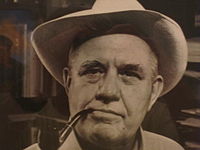J. Frank Dobie
| J. Frank Dobie | |
|---|---|
 |
|
| Born |
September 26, 1888 Live Oak County, Texas |
| Died | September 18, 1964 (aged 75) |
| Resting place | Texas State Cemetery |
| Occupation | Writer |
| Alma mater | Southwestern University |
| Period | 1919–1964 |
| Spouse | Bertha McKee Dobie (married 1916–1964, his death) |
James Frank Dobie (September 26, 1888 – September 18, 1964) was an American folklorist, writer, and newspaper columnist best known for many books depicting the richness and traditions of life in rural Texas during the days of the open range. As a public figure, he was known in his lifetime for his outspoken liberal views against Texas state politics, and for his long personal war against what he saw as bragging Texans, religious prejudice, restraints on individual liberty, and the assault of the mechanized world on the human spirit. He was instrumental in the saving of the Texas Longhorn breed of cattle from extinction.
Dobie was born on a ranch in Live Oak County, Texas, and was the eldest of six children. When he was young, his father, Richard, read to him from the Bible while his mother, Ella, read to him from stories such as Ivanhoe and Pilgrim's Progress. At 16, Dobie moved to Alice, the seat of Jim Wells County, Texas, where he lived with his grandparents and finished high school. In 1906, he enrolled in Southwestern University in Georgetown, Texas, where he was introduced to English poetry by a professor, who urged him to become a writer. While in college he also met "the ever loyal" Bertha McKee (1890–1974), whom he married in 1916.
After he graduated in 1910, Dobie worked briefly for newspapers in San Antonio and Galveston, before gaining his first teaching job at a high school in Alpine in southwestern Texas. In 1911, he returned to Georgetown to teach at the Southwestern Preparatory School, and in 1913, he went to Columbia University in New York City to work on a master's degree. In 1914, he returned to Texas to join the faculty of the University of Texas at Austin. He also became affiliated with the Texas Folklore Society. In 1917, he left the university to serve in the field artillery in World War I. He was briefly sent overseas at the end of the war and was discharged in 1919.
...
Wikipedia
